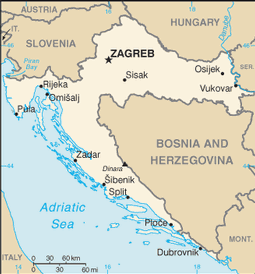Croatia
 Croatia is country of Europe located in south Europe.
Croatia is country of Europe located in south Europe.
Details
| Official Name: | Republic of Croatia |
| Capital: | Zagreb |
| Total area: | 56 594 km2 |
| GDP per capita: | $18,191 |
| Native Language: | Croatian |
| Government: | Unitary parliamentary constitutional republic |
| Population: | 4,284,889 |
| Major Religion: | Roman Catholicism |
| Monetary Unit: | Kuna (HRK) |
Croatia, officially the Republic of Croatia, is a unitary democratic parliamentary republic at the crossroads of Central Europe, the Balkans, and the Mediterranean. Its capital and largest city is Zagreb. The country is divided into 20 counties and the city of Zagreb. Croatia covers 56,594 square kilometres (21,851 square miles) and has diverse, mostly continental and Mediterranean climates. Croatia's Adriatic Sea coast contains more than a thousand islands. The country's population is 4.28 million, most of whom are Croats, with the most common religious denomination being Roman Catholicism. Having joined on 1 July 2013, Croatia is the newest, 28th member state of the European Union.
Croatia borders Bosnia and Herzegovina, Hungary, Montenegro, Serbia and Slovenia. It has been an independent country since 1991. For over 70 years before that, it was part of the former Yugoslavia.
The duchy of Croatia first appeared in the 8th century, becoming a kingdom 200 years later. It was heavily influenced by neighbouring Austria and Hungary in the following decades, while the 15th to 17th centuries saw frequent clashes with the Ottoman Empire.
The three colours of the Croatian flag represent Croatia’s three constituent states: the Kingdom of Croatia (red and white), the Kingdom of Slavonia (white and blue) and the Kingdom of Dalmatia (red and blue).
Croatia is a parliamentary democracy. Power is divided between: the elected parliament (legislative), the government and elected president (executive) and autonomous courts (judicial).
Much of Croatia is lowland. Its mountains and in particular its beaches attract many visitors. Croatia also has 1 246 islands and islets, of which just 48 are permanently inhabited.
Economy
Croatia has a high-income market economy. International Monetary Fund data shows that Croatian nominal GDP stood at $63.842 billion, or $14,457 per capita, at the same time in 2011 while purchasing power parity GDP was $80.334 billion or $18,191 per capita. According to Eurostat data, Croatian PPS GDP per capita stood at 61% of the EU average in 2012.
Real GDP growth in 2007 was 6.0 per cent. The average net salary of a Croatian worker in March 2013 was 5,516 kuna (US$ 988) per month. As of March 2013, registered unemployment rate in Croatia was 20.9%.
Immigration and residency
If you are interested in moving to the countries, either with a residence permit or by acquiring a citizenship, please contact us, and also get acquainted with the relevant migration documents.